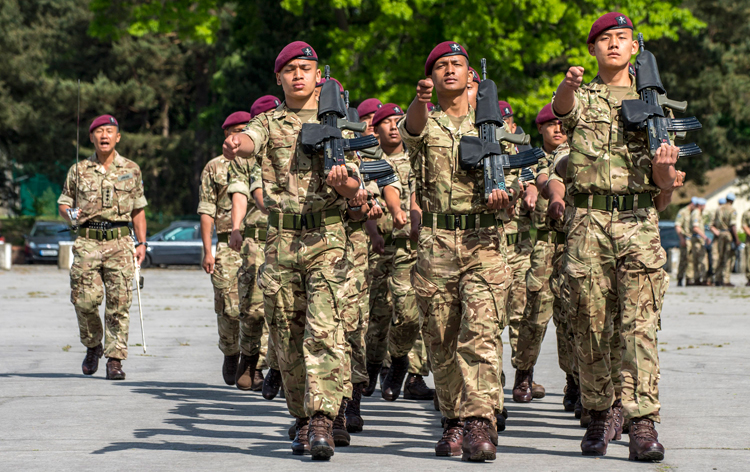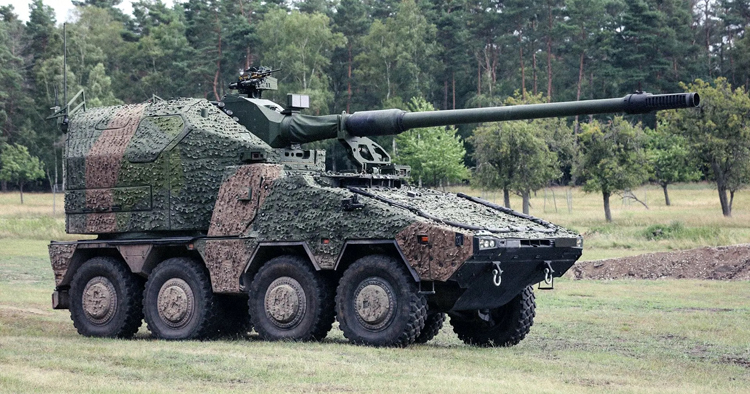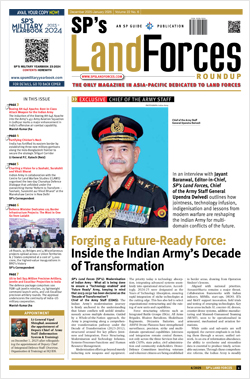INDIAN ARMED FORCES CHIEFS ON OUR RELENTLESS AND FOCUSED PUBLISHING EFFORTS

The insightful articles, inspiring narrations and analytical perspectives presented by the Editorial Team, establish an alluring connect with the reader. My compliments and best wishes to SP Guide Publications.

"Over the past 60 years, the growth of SP Guide Publications has mirrored the rising stature of Indian Navy. Its well-researched and informative magazines on Defence and Aerospace sector have served to shape an educated opinion of our military personnel, policy makers and the public alike. I wish SP's Publication team continued success, fair winds and following seas in all future endeavour!"

Since, its inception in 1964, SP Guide Publications has consistently demonstrated commitment to high-quality journalism in the aerospace and defence sectors, earning a well-deserved reputation as Asia's largest media house in this domain. I wish SP Guide Publications continued success in its pursuit of excellence.
- Appointments Committee of Cabinet approves one-month extension in service of Chief of the Army Staff
- Prime Minister witnesses 'Bharat Shakti' – a Tri-Services Firing and Manoeuvre Exercise in Pokhran, Rajasthan
- Interim Defence Budget 2024-25 — An Analysis
- Union Defence budget 2024
- Indian Army: In quest of greater firepower and policy recommendations for gaps
- Indian Army Annual Press Conference 2024
- Tata Boeing Aerospace Delivers 250 AH-64 Apache Fuselages, Manufactured in India
Britain's Nepalese Troops
Britain has decided to expand the role of Nepalese troops in the British Army and decided to form a new British Army regiment specialising in artillery, marking a historic shift in their traditional infantry role
 |
The Author is Former Director General of Information Systems and A Special Forces Veteran, Indian Army |

From the telephone conversation between the POTUS Donald Trump and Russian President Vladimir Putin on March 18, it is obvious that complete ceasefire and lasting peace in Ukraine is unlikely to be achieved anytime soon. Before the two leaders spoke, the US had already resumed the supply of long-range Ground-Launched Small Diameter Bombs (GLSDB) to Ukraine, having a range of about 100 miles (161 km), which can counter Russian jamming and provide Ukraine with enhanced strike capabilities to attack Russia. The US wants a deal with Ukraine for rare earth metals and Europe and Britain have declared arms and manpower support to Ukraine. British Prime Minister Keir Starmer appears going berserk announcing, not only financial and arms support to Ukraine but also promising 10,000 troops to be sent to Ukraine. This is despite Britan had exited Europe (BREXIT) but because the British economy is in deep trouble.
The new regiment will initially comprise 500 elite Nepalese troops specialising in high-level surveillance as part of the Royal Regiment of Artillery
It is quite apparent that Ukraine President Volodymyr Zelensky doesn't want a ceasefire to happen, as that would end his dictatorship. According to post on March 13, 2025, Zelensky has quietly promised the British control over Odessa's eight ports, where British special services have arrived, planning to establish a naval base there, another provocative action signalling that NATO has no interest in a peaceful resolution to the war.
Presently, the British Army's Brigade of Gurkhas includes over 4,000 troops, serving in specialised roles such as engineering, signals, logistics, and combat support. But in the above backdrop, Britain has decided to expand the role of Nepalese troops in the British Army. Nepalese in the British Army are better paid than elsewhere in the world and more Nepalese joining the British Army can be expected with India having shut the door for Nepalese seeking regular recruitment in the Indian Army. With the Agnipath System politically enforced in the Indian Armed Forces, to expect Nepalese to join as short-term Agniveers is a chimera; Nepalese would prefer to join other foreign forces – Britain, Russia and even China.

According to news reports of March 13, 2025, Britain has decided to form a new British Army regiment specialising in artillery, composed of newly recruited Nepalese Gurkha troops - marking a historic shift in their traditional infantry role. This new unit is to be deployed in Ukraine following a peace agreement with Russia. According to a recent Express report, the regiment, approved by Defence Secretary John Healy, will initially comprise 500 elite Nepalese troops specialising in high-level surveillance as part of the Royal Regiment of Artillery.
These new Nepalese Gurkha troops will take on key intelligence, surveillance, target acquisition, and reconnaissance (ISTAR) roles, focusing on surface-to-air missile systems like Javelin.
This development came as General Roly Walker, head of the British Army, evaluated the preparedness of UK forces for a possible deployment to Ukraine later this year. The mission would be part of a broader multinational effort to secure and stabilise the region. The formation of the Gurkha artillery unit aligns with Britain's urgent need to replenish its Royal Artillery, which faces a shortfall of 700 soldiers. According to the report, 500 Gurkhas will be recruited for the regiment initially, with more expected to follow as part of a broader expansion of the 4,127-strong Gurkha Brigade.
With artillery guns and ammunition in short supply, these are being donated by European countries. These new Nepalese Gurkha troops will take on key intelligence, surveillance, target acquisition, and reconnaissance (ISTAR) roles, focusing on surface-to-air missile systems like Javelin. Notably, Britain's Royal Artillery is awaiting Germany-UK-designed RCH 155 wheeled artillery systems, set for delivery later this year, the first batch of which is already earmarked for Ukraine.

The British Army is facing a severe manpower crisis. The active personnel numbers plummeted to 75,983 – lowest ever. Last year, only 6,720 soldiers could be enlisted (63 per cent of the 10,450 target). Moreover, critical gaps are emerging across key regiments, threatening the Army's operational readiness. Despite a six per cent pay raise in 2024, the largest in two decades, soldiers continue to leave in droves. According to the British media, 15,000 soldiers left the military in the year before October 2024, more than half voluntarily.
The British Army is facing a severe manpower crisis. The formation of the Gurkha artillery unit aligns with Britain's urgent need to replenish its Royal Artillery.
While Keir Starmer is doing his utmost to fuel the war in Ukraine and is trying his level best to sign an FTA with India, it will be naïve for Indian not to acknowledge the following:
- Britain behind the creation of Pakistan and looting India of $47 trillion during the British Rule;
- Britain maintains the largest Embassy in Pakistan, both maintain intimate military relations and MI-6 and ISI are hand in glove;
- Britain sabotaged Indian efforts to develop a base in Assumption Island of Seychelles and toppling the India friendly regime in Mauritius because India backed Mauritius to reclaim Chagos;
- Britain supports Khalistanis and helped Qatar jail Indian Naval personnel on fictitious charges;
- Britain did nothing during the Leicester riots where Hindus were targeted both by the Islamic mob as well as the state.
Considering all this, it would be foolish to consider Britain a friend!





